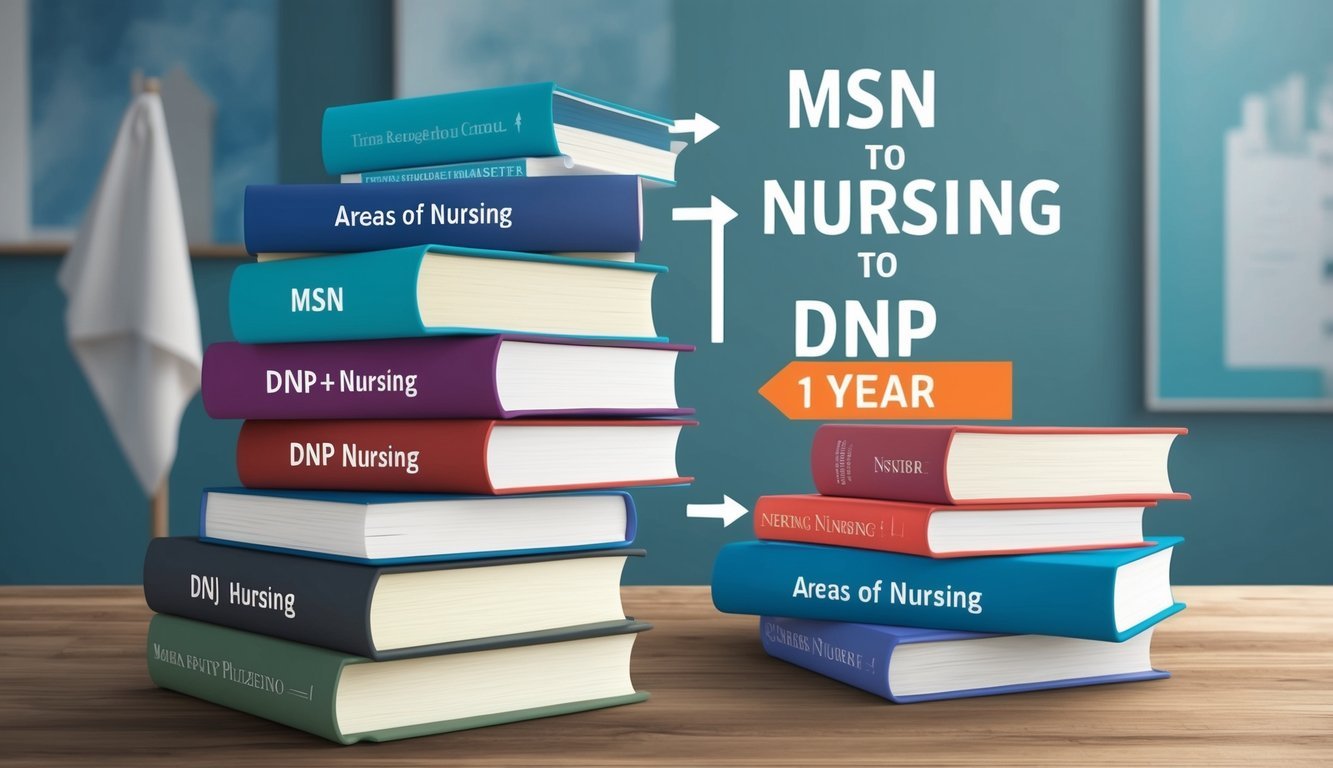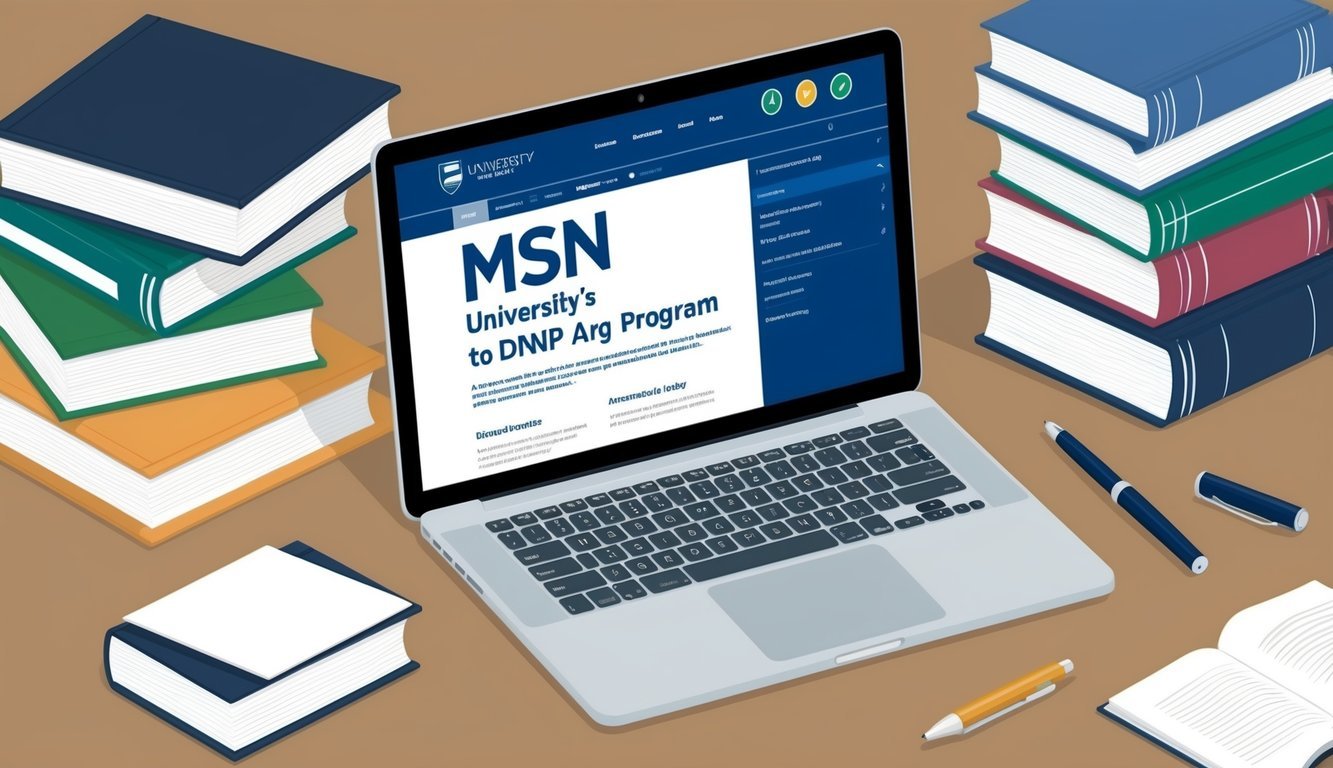If you’re a registered nurse looking to advance your career quickly, the 1 Year MSN to DNP program might be the perfect fit for you.
This program allows you to earn your Doctor of Nursing Practice degree in just one year.
You can take on leadership roles and enhance your clinical skills efficiently.
Designed for those already holding a Master of Science in Nursing, this accelerated program offers a comprehensive curriculum tailored to meet the needs of advanced nursing practice.
With flexible online options available, you can balance your education with your personal and professional commitments.
The coursework often includes essential topics in leadership, health policy, and quality improvement.
As you progress, you’ll find that the program not only elevates your qualifications but also broadens your opportunities for career advancement.
Now is the time to consider how a 1 Year MSN to DNP program can reshape your nursing career and open new doors.
Whether you aim to become a nurse practitioner, a healthcare administrator, or a policy advocate, this program sets the foundation for success in today’s evolving healthcare landscape.
Key Takeaways
- You can complete the MSN to DNP program in just one year.
- The curriculum focuses on advanced nursing practice and leadership.
- Graduates improve their career prospects and influence in healthcare.
Overview of the MSN-to-DNP Program
An MSN-to-DNP program offers an excellent path for registered nurses holding a Master’s in Nursing to advance their education.
These programs prepare you for leadership roles, emphasizing clinical practice and nursing science.
This section will cover the definition of a DNP, the importance of advanced education in nursing, and the key differences between MSN and DNP degrees.

Definition of DNP
The Doctor of Nursing Practice (DNP) is a terminal degree in nursing focused on clinical practice rather than research.
This degree prepares you to assume leadership roles in healthcare settings, pushing for improvements in patient care and outcomes.
DNP programs typically cover advanced topics like health policy, organizational management, and clinical guidelines.
By earning a DNP, you gain skills that enhance your ability to apply research to practice.
This focus distinguishes it from a Ph.D. in Nursing, which is more research-oriented.
You can earn a DNP through various pathways, including a direct MSN-to-DNP track.
This allows for a streamlined transition from your Master’s in Nursing to this advanced degree.
Importance of Advanced Education in Nursing
Advanced education in nursing is crucial in today’s rapidly evolving healthcare landscape.
As healthcare becomes more complex, nurses with a DNP can lead initiatives that improve patient care.
A DNP equips you with the skills to address pressing healthcare challenges, such as patient safety, health disparities, and quality improvement.
Statistical data indicates that patients treated by DNP-prepared nurses often experience better outcomes.
Moreover, healthcare organizations increasingly prefer or require advanced degrees for leadership positions, enhancing your career opportunities.
Investing in a DNP also enables you to contribute to shaping healthcare policy and education, allowing for a broader impact on the nursing profession and patient care.
Key Differences Between MSN and DNP Degrees
While both the Master of Science in Nursing (MSN) and DNP degrees prepare you for advanced practice, there are notable differences between them.
| Feature | MSN | DNP |
|---|---|---|
| Focus | Clinical skills and knowledge | Leadership and practice improvement |
| Duration | Typically 1-2 years | Usually 2-3 years |
| Capstone Project | May require a thesis | Requires a substantial practice project |
| Career Outcomes | Advanced Practice Registered Nurse (APRN) | Nurse Executive, Clinical Leader |
Earning a DNP often involves a broader scope than an MSN, with an emphasis on evidence-based practice, healthcare policy, and ethical leadership.
This prepares you for roles that require high-level decision-making and strategic thinking.
Choosing the MSN-to-DNP pathway sets you up for greater impact and advancement in your nursing career.
Curriculum and Coursework
In a one-year MSN to DNP program, you will engage in a comprehensive curriculum designed to equip you with advanced clinical skills and leadership abilities.
This curriculum includes core subjects, clinical experience, and the integration of evidence-based practice.

Core Subjects and Specialties
The core curriculum typically covers key areas essential for advanced practice.
You will study subjects such as Population Health, Health Systems Leadership, and Clinical Practice.
| Core Subject | Description |
|---|---|
| Advanced Pathophysiology | Understanding complex disease mechanisms |
| Pharmacology | In-depth study of medications and their effects |
| Health Policy | Exploration of health care systems and regulations |
| Research Methods | Learning to conduct and evaluate healthcare research |
You can choose from various APRN specialties to tailor your education, such as Family Nurse Practitioner, Pediatric Nurse Practitioner, and Adult-Gerontology Nurse Practitioner.
Courses focus on real-world applications relevant to your chosen area.
Clinical Experience Requirements
Clinical experience is a vital part of your training in the MSN to DNP program.
You will complete a specified number of clinical hours, working under the supervision of experienced practitioners.
Expect to engage in diverse settings, which may include:
- Hospitals
- Community Health Centers
- Outpatient clinics
This hands-on experience allows you to apply theoretical knowledge in practical settings, enhancing your clinical skills.
Your program will often specify the number of hours required based on your specialty area.
Integration of Evidence-Based Practice
Evidence-based practice (EBP) will be a cornerstone of your education.
You will learn to integrate research findings into clinical decision-making.
Your coursework will focus on:
- Identifying credible research
- Appraising the quality of evidence
- Implementing findings in patient care
You will also work on projects that emphasize improving patient outcomes through EBP.
This integration is crucial for driving innovations in health care and ensuring high-quality care for diverse populations.
For further information, you can explore resources on evidence-based nursing.
Admission Requirements and Process
When applying for a 1-year MSN to DNP program, it’s crucial to understand the specific requirements and the application process.
This knowledge will help you prepare and submit a strong application.

Academic Prerequisites
To qualify for a 1-year MSN to DNP program, you typically need a Master of Science in Nursing (MSN) degree from an accredited nursing school.
A minimum cumulative GPA of 3.0 is commonly required.
Some programs may also accept transfer credits from other accredited institutions.
In addition, you must hold a current valid Registered Nurse (RN) license.
This license should be from the state where the program is offered or from a Nurse Licensure Compact state.
Ensuring you meet these academic requirements is vital for a successful application.
Application Materials
Your application will need various materials to be considered complete.
Here’s a list of common items you should prepare:
| Required Material | Description |
|---|---|
| Official Transcripts | Transcripts showing your academic history. |
| Letters of Recommendation | Typically two to three letters from professional references. |
| Goal Statement | A personal statement explaining your career goals. |
| Current Resume | A resume detailing your education and experience. |
| GRE Scores | Some programs may require GRE scores; check specific requirements. |
Make sure each document reflects your best work and presents your qualifications clearly.
Evaluating Letters of Recommendation
When obtaining letters of recommendation, choose individuals who can speak to your abilities and potential in the nursing field.
Ideally, they should be professionals in healthcare or academia who know you well.
Each letter should focus on different strengths.
For example:
- Nursing Skills: Highlight your clinical skills and patient care abilities.
- Leadership Qualities: Discuss your potential to lead in healthcare settings.
- Academic Potential: Reflect on your ability to succeed in advanced studies.
Ensure your recommenders understand the program’s focus and values, which can help tailor their letters.
Strong recommendations can significantly impact your application by showcasing your qualifications and readiness for the DNP program.
Program Duration and Structure
The structure and duration of a 1 Year MSN to DNP program are designed to accommodate working nurses while providing a robust education.
You will find that many programs offer accelerated pathways and the flexibility of online coursework to fit your busy schedule.
Accelerated Learning Pathways
Accelerated learning pathways are a key feature of many 1 Year MSN to DNP programs.
These pathways allow you to complete your degree in a condensed time frame, often in as little as one year.
Typically, these programs emphasize advanced clinical practice and may require you to complete intensive coursework.
Many schools offer credit transfers for previous coursework, which can further reduce your time to degree completion.
You can also expect to participate in a clinical experience component, where you apply what you’ve learned in real-world settings, thus enhancing your skills and knowledge.
Online Coursework and Flexibility
Most programs offer online coursework to provide you with flexibility.
This format allows you to balance your studies with your professional and personal responsibilities.
You can often access lectures, discussions, and assignments at your convenience, making it easier to study during your free time.
Many platforms also provide academic support through online resources and advisor guidance, ensuring you have the help you need throughout the program.
Career Outcomes and Leadership Opportunities
Completing a 1-year MSN to DNP program opens the door to advanced roles and responsibilities in healthcare.
As you gain higher qualifications, your leadership potential expands across various sectors, improving patient care and organizational effectiveness.
Roles in Healthcare Leadership and Management
With a DNP degree, you can transition into key roles within healthcare leadership.
You may become a Director of Nursing, Chief Nursing Officer, or even a Healthcare Administrator.
These positions require strategic thinking and the ability to influence policies and practices within healthcare settings.
As a leader, you will oversee nursing staff, manage budgets, and implement quality improvement initiatives.
Your training in evidence-based practice equips you to make informed decisions that can enhance patient outcomes.
Statistics show that effective nursing leadership can reduce hospital readmission rates and improve patient satisfaction scores.
Nursing Informatics and Healthcare Policy
Nursing informatics is an emerging field that combines nursing knowledge with technology.
By leveraging data systems, you can help design effective healthcare policies and improve patient care processes.
The role of a Nurse Informaticist requires skills in data analysis and communication with IT departments.
Your expertise can drive changes that optimize the use of electronic health records (EHRs) and improve overall healthcare delivery.
Staying informed about health policy can empower you to advocate for needed reforms, making your role crucial in shaping a more effective healthcare system.
Impact on Patient Safety and Quality Improvement
Your advanced education in a DNP program enhances your ability to focus on patient safety and quality improvement.
You will learn advanced methodologies for assessing and improving healthcare practices.
Roles such as Quality Improvement Coordinator or Patient Safety Officer may become available to you.
Your contributions can lead to reduced medical errors, streamlined patient care processes, and improved health outcomes.
Implementing evidence-based protocols can lead to significant advancements in patient care quality.
By focusing on measurable outcomes, you can genuinely impact the efficacy of healthcare services in your community.
With these opportunities, your career can evolve into one that significantly influences healthcare leadership and innovation.
Frequently Asked Questions

This section addresses common inquiries related to enrolling in and completing an online MSN to DNP program.
You will find information on requirements, program duration, curriculum structure, accreditation, and specialization options.
What are the requirements for enrolling in an online MSN to DNP program?
To enroll in an online MSN to DNP program, you typically need to hold a Master of Science in Nursing (MSN) degree.
Many programs require a valid nursing license and a minimum GPA, often around 3.0.
Additionally, you may need to provide letters of recommendation, a personal statement, and proof of clinical experience.
What is the typical duration of MSN to DNP programs across various universities?
The duration of MSN to DNP programs can vary.
Generally, a one-year program allows you to complete your degree faster than traditional programs, which may take 2 to 3 years.
Some universities also offer accelerated options that can be finished in under 12 months.
Can the MSN to DNP curriculum be completed entirely online, and are there any in-person requirements?
Many MSN to DNP programs are designed to be completed entirely online.
However, some may require in-person components, such as clinical placements or residency experiences.
Always check specific program details for any on-campus requirements.
What are the accreditation considerations for MSN to DNP programs?
It is essential to choose an accredited program.
Accreditation ensures that the program meets specific educational standards.
Look for programs accredited by the Commission on Collegiate Nursing Education (CCNE) or the Accreditation Commission for Education in Nursing (ACEN).
How does a one-year DNP program differ from traditional DNP programs in terms of coursework and clinical hours?
One-year DNP programs often have a more intensive coursework structure.
They may also require fewer clinical hours compared to traditional programs, which usually spread out the requirements over a longer period.
This allows for a faster path to completing your degree.
Are there specialized tracks within MSN to DNP programs, and how do they affect the program duration?
Yes, many MSN to DNP programs offer specialized tracks, such as family nursing, leadership, or education.
These tracks can affect program duration.
Some may require additional courses or clinical hours, potentially extending completion time.
Be sure to research each track’s specific requirements.

